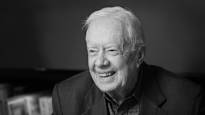Former President of the United States Jimmy Carter has died at the age of 100. Carter served one term as President of the United States from 1977 to 1981.
Born in the state of Georgia, Carter joined the cadet school at the United States Naval Academy after his teenage years. After graduating from there, he pursued a career in the US Navy.
Carter began his political career in his home state of Georgia, where he was first elected to the state Senate in the 1960s and later Governor of Georgia from 1971 to 1975.
While governor, Carter entered the Democratic primary to run for the 1976 presidential election.
Carter entered the presidential race as a major underdog, as he had no experience in politics at the federal level and his name was not well known outside of Georgia.
Indeed, Carter’s opponents attacked him with the slogan: “Jimmy who?”
Carter came up with a counter-slogan, which he began to repeat as he campaigned harder than others around the country.
The famous phrase became: “My name is Jimmy Carter and I am running for president.”
Opponents also tried to portray Carter as a country peanut farmer, because farming the peanut farm that passed down in Carter’s family was a hobby dear to Carter. Finally, Carter managed to turn peanuts into a positive image.
The Watergate scandal that rocked the United States in the early 1970s and the president Richard Nixon after the divorce, Carter’s image as an outsider helped him. Carter focused on campaigning for change and restoring integrity to the capital, which catapulted him to the Democratic nomination.
For the actual election, Carter left in good positions, as the sitting president Gerald Ford had risen to the presidency from the vice presidency after Nixon’s resignation in 1974. His campaign was plagued by voters’ memory of Nixon.
– I will never lie to you, Carter repeated while campaigning, keeping Nixon in the mind of voters.
Carter won the 1976 election by a 297–240 electoral vote.
Carter’s reputation suffered from inflation and the hostage crisis
Carter was an active president in foreign policy, and he made the promotion of human rights the top priority of his foreign policy. This was the departure of the White House foreign policy leader in the early 1970s Henry Kissinger from a line that relied on real politics.
In the early part of his term, Carter tried to soften the relations between the United States and the Soviet Union, but the Soviet invasion of Afghanistan in 1979 made Carter toughen his line.
During the Carter era, the United States and the Soviet Union signed the Salt 2 Treaty aimed at limiting nuclear weapons. The United States also established diplomatic relations with China.
In the Middle East, Carter famously served as a mediator in the 1978 Camp David peace that ended the state of war between Egypt and Israel.
In his home country, Carter increased environmental protection. As a symbolic gesture, he installed, among other things, 32 solar panels in the White House.
Carter also established the Department of Education in the United States, pushed for publicly supported housing, and appointed the first black judge to the Supreme Court, Thurgood Marshall.
At the beginning of the Carter era, the US economy was just recovering from the recession of the early 1970s and at the same time began to suffer from high inflation. Carter appointed head of the US Federal Reserve by Paul Volckerwhich raised the central bank’s key interest rate sharply to bring inflation under control.
Carter’s popularity began to suffer due to the combination of high inflation and high interest rates.
In addition, after the Iranian revolution in November 1979, protesters supporting the revolution seized the US embassy in Tehran and took dozens of embassy workers hostage.
Carter failed to secure the release of the hostages through negotiations or a planned rescue operation, further weighing on his support as the 1980 presidential election approached.
Carter ultimately lost the election by a clear margin to the Republican candidate For Ronald Reagan.
The promoter of human rights was awarded the Nobel Prize
After his presidency, Carter focused on promoting human rights through the non-governmental organization he founded, the Carter Center. His post-presidency career is widely regarded as one of the most active and successful in American history.
Carter was awarded the Nobel Peace Prize in 2002 for his work for peace, democracy and human rights, as well as economic and social development.
Carter was a devout Christian and an active member of the Baptist Church. He taught Sunday school in his hometown on Sundays even in his old age.
During his last years, Carter had to reduce his public appearances due to his advanced age and illness. At the end of his most recent hospital stays, Carter decided to spend his final days at home with his family and was moved into hospice care.
Carter lived to become the longest-lived president in US history. He also managed to live a record long time after his presidency, almost 44 years.
Carter died at home in the small town of Plains, Georgia – the same town where he had been born in 1924.
Updated at 11:19 p.m.: Corrected Carter’s correct age in the caption.
